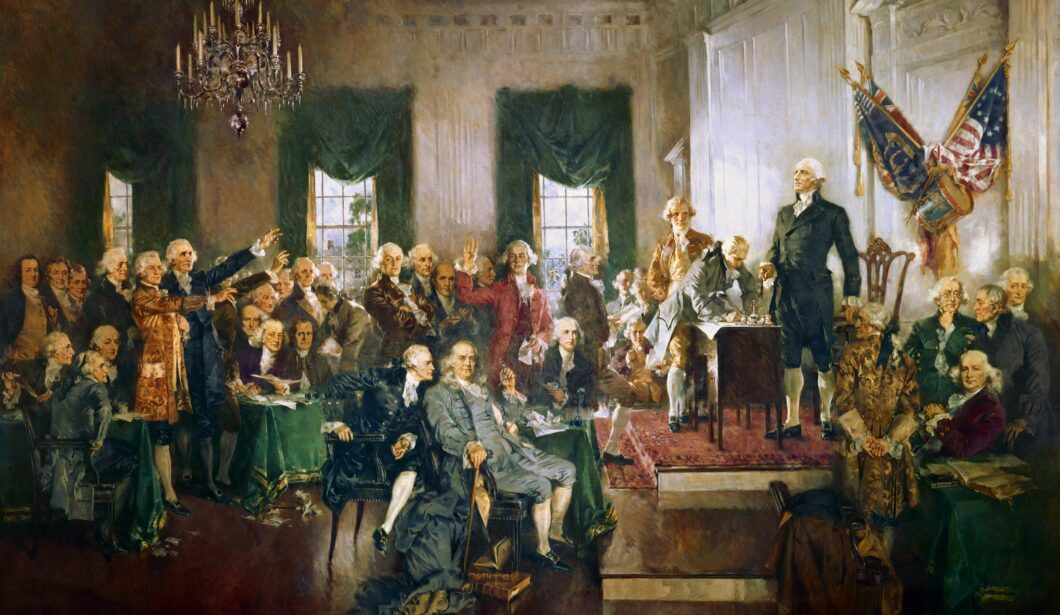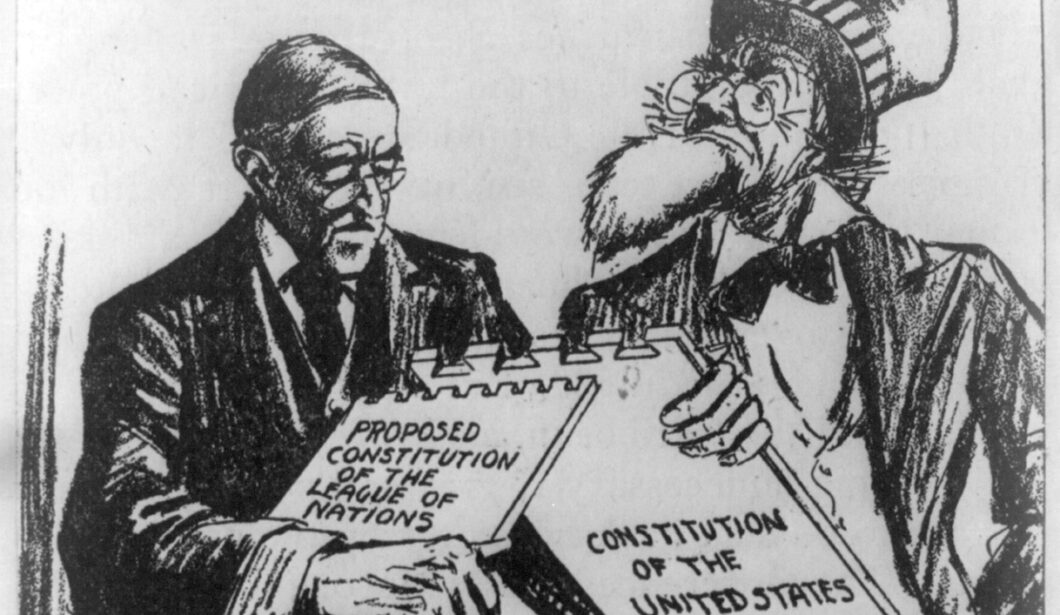In American Leviathan Ned Ryun tracks the rise of Progressive Statism and its massive, bureaucratic administrative state at the turn of the 20th century. Governmental abuse by a class of so-called experts has grown unchecked because of Progressives’ quiet regime change over the last century and their replacing of our constitutional republic with an administrative state. Our government today has vanishingly fewer relations to what the Founders envisioned.
—
If you boil down the essence of Progressive Statist thought, it comes to this: progress is to be achieved by the creation of a massive bureaucracy, completely separated from politics and political accountability, filled with an educated elite who are then to do the actual governing for the country. To loosely quote Wilson, this educated elite would consist of “the best boys from the best colleges,” who would be trained and educated in administration and applied science from a burgeoning series of colleges and universities.
That’s why many of the new universities and colleges founded in the late 1800s and early 1900s by Progressive Statists were done so for a unique reason: the explicit goal of importing Hegelian Prussian Statism into America and training a new generation of “administrators” for the administrative state. For example, Johns Hopkins, founded in 1876, was “established for the express reason of bringing the German educational model to the United States and produced several prominent Progressives, including Wilson, Dewey and Frederick Jackson Turner.” These new administrators would then, with as little hindrance and oversight as possible from politicians (i.e., the duly elected representatives of the people), do the actual governing and help direct the course of the nation in the most efficient way to achieve progress for all.
…the essence of Progressive Statist thought… comes to this: progress is to be achieved by the creation of a massive bureaucracy, completely separated from politics and political accountability…
Efficiency became a byword for the Progressive Statists as they sought to apply it in all areas: government, manufacturing, race, gender, family. Name any aspect of life and there would be a busybody Progressive working on making it more efficient: efficient citizenship, efficient motherhood, efficient charity, efficient medicine, even efficient religion. The gospel of efficiency had legions of evangelists eager to meddle in every aspect of American life. Gone for them would be the messy, inefficient days of a pure constitutional republic with its separation of powers, its federalism, and its factions always seesawing back and forth with power, limiting the ability to consolidate power for “progress.”
Of course, these elements the Progressive Statists despised were features, not bugs, of a constitutional republic built to protect inherent rights and human nature from itself. But now all of that would be left behind as America entered an “enlightened age.” Through the power of the administrative state and an educated elite, society could now progress: utopia on earth could be achieved through the power of applied science.
Except it was all a lie, built on a foundation of sand.
The lie revolves around one very fundamental issue. At the heart of the differences between a constitutional republic and an administrative state are polar-opposite beliefs about human nature.

The Founders of the free American Republic were optimistic realists: deeply realistic about human nature with its multitude of flaws and shortcomings, yet optimistic that they could, working with imperfect human nature, create a government that protected all of the God-given rights to life, liberty, and the pursuit of happiness. Faced with the challenge of creating a government strong and responsive enough to advance and protect these rights from foreign and domestic threats (including itself), the Founders infused the nascent Republic with transcendent values that have stood the test of time.
As such, the Founders were deeply distrustful of human nature and strongly believed that imperfect human beings should never be trusted with consolidated power. The foundational principle in the Constitution of the separation of power inside of government is meant overtly to weaken and limit government’s power. The Founders firmly believed in a very specific use of government: to secure every basic, natural, inherent right via a republic built on the consent of the governed and to take none of those rights away. But they also realized very clearly that human beings are “no angels.” In a fallen world in which many do what they can, not what they should, there is a need for government: boundaries to prevent and protect against the worst of human nature while providing for the flourishing of inherent rights to life, liberty, and the pursuit of happiness.
But within that government, to protect those natural rights given to us by our Creator, the power of government must be diffused as much as possible, not only in the federal government but between the federal government and the state governments as well. Government was meant to have a light touch in almost every aspect, present but in the background.
…the Founders infused the nascent Republic with transcendent values that have stood the test of time.
However, the seismic, massive shift toward Progressive Statism at the turn of the 20th century brought with it a rejection of that fundamental belief. Armed with all the fervor of religious zealots, they determined that science and an educated elite would accelerate human progress. Frustrated by the Founders’ Constitution, which limited government and separated powers, the Progressive Statists set forth on a great expansion of the state, sure that a powerful administrative state would solve all of society’s ills. There were many motivations for Progressives to pursue this, most of them misguided but, in all fairness, some not, as in the case of railroad corporations that rigged politics for their own gain. In Progressives’ minds, the state was now the provider from which the American people could claim their rights; government was not necessarily the protector of already-existing rights, but government would now allocate rights as it deemed necessary for the advancement and enlightenment of society. Now, in the hands of an educated elite, government was not something to be feared but something to be embraced.

Whereas the Founders were optimistic realists, the Progressives were utopian statists, deeply naive, willfully so, about human nature and the dangers of concentrated power. They mistakenly, including the post-millennial Social Gospel types, sought utopia in a fallen world; many of those who led the Social Gospel movement, such as Walter Rauschenbusch, believed that they could in fact, through the vehicle of the enlightened state, build the Kingdom of God on earth. All of this nonsense led Progressive Statists to work on concentrating tremendous power in the hands of a relative few. In defiance of the ages, in Progressive thinking, human nature was not inherently evil but was perfectible and could rise to a higher plane. Therefore, consolidated power inside the state was good because it could “perfect” human nature.
…the Progressives were utopian statists, deeply naive, willfully so, about human nature and the dangers of concentrated power.
Unelected, educated elites, armed with immense power, were to fill the envisioned administrative state, separated as much as possible from politics, elected officials, and the accountability the people’s representatives bring. The walls dividing the branches of government were to be knocked down, power consolidated in the hands of the educated elite to advance progress as efficiently as possible.
Bureaucrats in the vast administrative state were to be equipped, in theory and oftentimes in reality, with all the powers of the executive, legislative, and to a certain extent judicial branches, all in pursuit of efficiency that would lead to progress and eventually utopia: “Administrative government . . . demanded that the divided powers of the US government be consolidated. The Constitution’s separation of powers doctrine, which, decentralized by design, was as inefficient and obsolete as was the ‘planned scramble of little profiteers’ in the age of consolidated industry. Efficient administration required that government, like industry, be consolidated, centralized, organized and administered.” In short, Progressive Statists wanted an oligarchy of an expert class, unhindered by a constitution, unbothered by representative interference, and free to do their own “enlightened” meddling with every aspect of society, supposedly for the “greater good” of bringing salvation to the dirty little peasants.”
Read more in American Leviathan: The Birth of the Administrative State and Progressive Authoritarianism
Title Image: “… And no hitting below the belt” – Courtesy, Etta Hulme Papers, Special Collections, The University of Texas at Arlington Libraries
